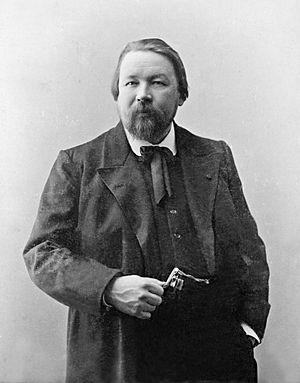Mikhail Ippolitov-Ivanov facts for kids
Mikhail Mikhailovich Ippolitov-Ivanov (born Mikhail Mikhailovich Ivanov) was a famous Russian and Soviet composer, conductor, and teacher. He lived from 1859 to 1935. His music style was from the late-Romantic period and continued into the 20th century.
Early Life and Education
Mikhail Ippolitov-Ivanov was born in 1859 in a town called Gatchina, which is near St. Petersburg, Russia. His father worked as a mechanic at the palace there. Mikhail's birth name was Mikhail Mikhailovich Ivanov. Later, he added "Ippolitov" to his name. This was his mother's maiden name. He did this to avoid confusion with another composer and music critic who had the same name.
Mikhail started learning music at home. He was also a choirboy at Saint Isaac's Cathedral in St. Isaac, where he received more music lessons. In 1875, he joined the Saint Petersburg Conservatory, a special music school. He studied composition there with a very important teacher named Nikolai Rimsky-Korsakov. Mikhail finished his studies in 1882. Rimsky-Korsakov's teaching had a big impact on Mikhail's own music style.
Career and Teaching
Mikhail Ippolitov-Ivanov's first job was in Tbilisi, the main city in Georgia. He became the director of the music academy and the conductor of the orchestra there. He stayed in Tbilisi for seven years. During this time, he became very interested in the traditional music of the Georgian region. This was part of a wider interest in the music of different cultures and neighbors at that time. One of his students in Tbilisi was a conductor named Edouard Grikurov.
On May 1, 1886, in Tbilisi, Mikhail conducted the very first performance of the third version of Tchaikovsky's famous Romeo and Juliet Overture-Fantasia.
In 1893, Ippolitov-Ivanov became a professor at the Moscow Conservatory. He later became the director of this important music school, from 1905 to 1924. He also worked as a conductor for several groups, including the Russian Choral Society and the Mamontov and Zimin Opera companies. After 1925, he conducted at the famous Bolshoi Theatre. He also shared his musical knowledge through radio broadcasts and by writing for music magazines.
Mikhail Ippolitov-Ivanov kept his own ideas about music. He was the president of the Society of Writers and Composers in 1922. He didn't get involved in arguments between musicians who wanted new music styles and those who wanted "proletarian art" (art for the working class). His own music style was set in the 1880s, influenced by his teacher Rimsky-Korsakov. He also loved folk music, especially from Georgia. He even returned to Tbilisi in 1924 for a year to help organize the Conservatory there. He passed away in Moscow in 1935.
Some of his students who became well-known composers include Reinhold Glière and Sergei Vasilenko.
Musical Works
Ippolitov-Ivanov wrote many different types of music. These included operas, orchestral pieces, chamber music (for small groups of instruments), and many songs. His music sounds similar to his teacher Rimsky-Korsakov's style.
One of his most famous works is the orchestral suite Caucasian Sketches (Kavkazskiye Eskizi), which he wrote in 1894. A very popular part of this suite is called "Procession of the Sardar." Today, his other music is not heard as often.
Besides his own original music, Ippolitov-Ivanov also helped finish an opera by Modest Mussorgsky called Zhenitba.
In 1934, he received an important award called the Order of the Red Banner of Labour.
List of Works
- Caucasian Sketches
- Suite No. 1, Op. 10 (1894)
- Suite No. 2, Op. 42 (Iveria) (1896)
- Symphony No. 1 in E minor, Op. 46 (1908)
- Yar-khmel (Spring Overture), Op. 1 (1882)
- Violin Sonata, Op. 8 (published by D. Rahter of Leipzig, 1887, Score from Sibley Music Library Digital Scores Collection)
- Quartet for piano and strings, Op. 9
- String Quartet No. 1 in A minor, Op. 13 (published around 1890)
- Ballade Romantique for violin and piano, Op. 20 (published by Universal Edition in 1928)
- Symphonic Scherzo, Op. 2
- Three Musical Tableaux from Ossian, Op. 56
- Lake Lyano
- Kolyma's Lament
- Ossian's Monologue on Contemporary Heroes
- Liturgy of St. John Chrysostom, Op. 37
- Vespers, Op. 43
- Jubilee March, Op. 67
- Armenian Rhapsody on National Themes, Op. 48
- Turkish Fragments, Op. 62 (1930)
- Turkish March, Op. 55 (1932)
- An Episode from the Life of Schubert, Op. 61 (1920)
See also
 In Spanish: Mijaíl Ippolítov-Ivánov para niños
In Spanish: Mijaíl Ippolítov-Ivánov para niños
 | Valerie Thomas |
 | Frederick McKinley Jones |
 | George Edward Alcorn Jr. |
 | Thomas Mensah |


